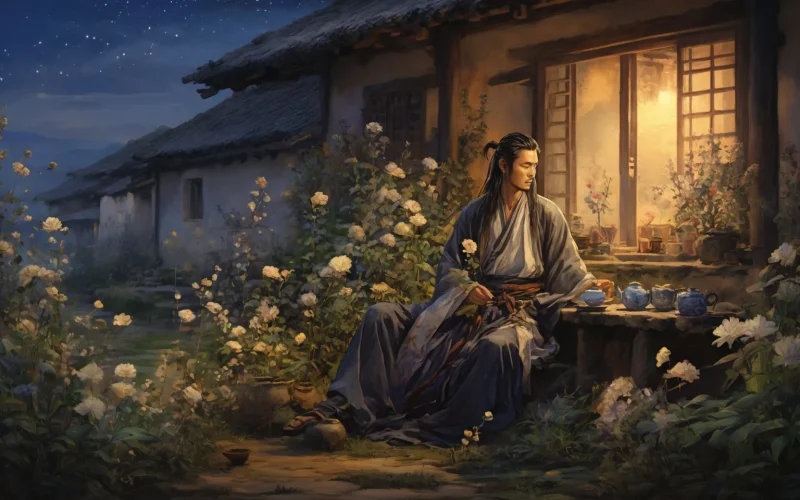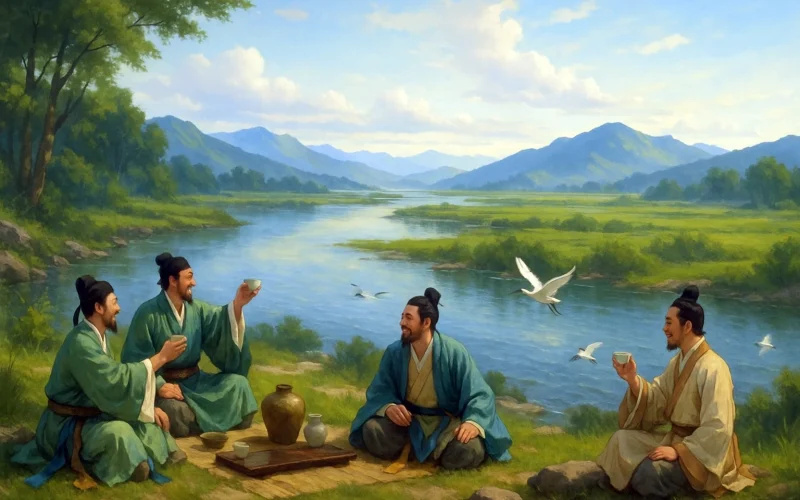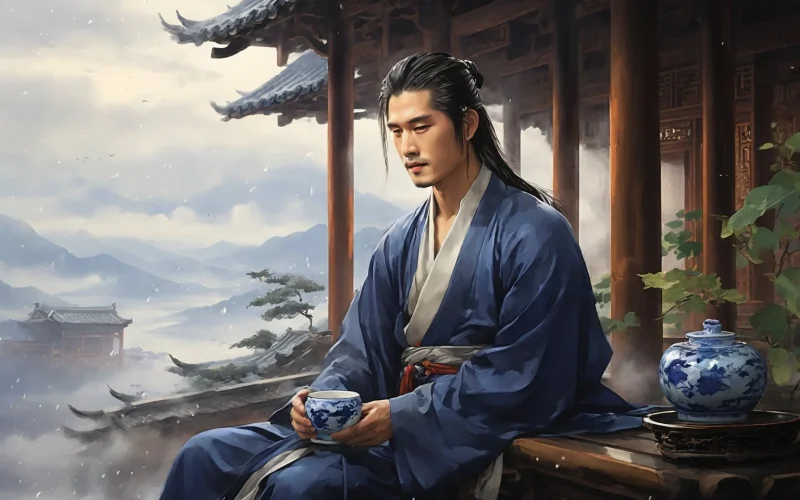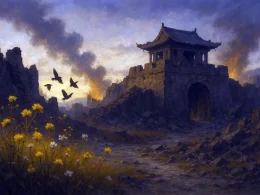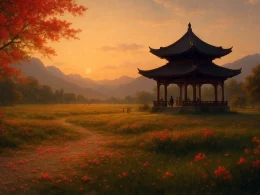Confucius told us to do properly
And not to worry about poverty.
How to follow our Master who sees far?
I can be busy as all farmers are.
In time I will do farm work, plough in hand,
Smiling, I talk with them who till the land.
Winds coming from afar caress the plain;
Tender shoots welcome spring to come again.
Though we know not how much we’ll reap this year,
Yet farm work in the field evokes our cheer.
At times when we are tired, we take a rest,
None come to inquire about east or west.
Coming back when the sun’s on the decline,
I’ll see my neighbors with a pot of wine.
Crooning a poem, then I close the door.
Content, what does a farmer need for more.
Original Poem
「癸卯岁始春怀古田舍 · 其二」
陶渊明
先师有遗训,忧道不忧贫。
瞻望邈难逮,转欲志长勤。
秉耒欢时务,解颜劝农人。
平畴交远风,良苗亦怀新。
虽未量岁功,既事多所欣。
耕种有时息,行者无问津。
日入相与归,壶浆劳近邻。
长吟掩柴门,聊为陇亩民。
Interpretation
Composed in the spring of 403 AD during Emperor An's reign of Eastern Jin, these poems reflect Tao Yuanming's life after resigning from office in 401 AD following his mother's death. When Huan Xuan seized the capital in 402 AD, plunging the nation into chaos, Tao's disillusionment solidified his commitment to farming. Written after participating in spring plowing, these verses celebrate pastoral joys while expressing admiration for ancient hermits' virtue, revealing his struggle between reality and idealism.
First Couplet: "先师有遗训,忧道不忧贫。"
xiān shī yǒu yí xùn, yōu dào bù yōu pín.
The ancient sage left teachings clear: Worry about Dao, not poverty severe.
Invoking Confucius' teachings, the poet prioritizes spiritual over material pursuits. This seemingly resolute statement subtly acknowledges life's practical difficulties, foreshadowing coming contradictions.
Second Couplet: "瞻望邈难逮,转欲志长勤。"
zhān wàng miǎo nán dǎi, zhuǎn yù zhì cháng qín.
Gazing at heights I cannot reach, I turn to tillage's constant teach.
Aware of his distance from sages' perfection, the poet finds motivation in diligent farming, embodying both reverence and practical effort to approach the ideal.
Third Couplet: "秉耒欢时务,解颜劝农人。"
bǐng lěi huān shí wù, jiě yán quàn nóng rén.
Holding plow, I delight in earthly chores, Smiling, I cheer the farmers outdoors.
This active farming scene shows genuine participation beyond passive acceptance. His joyful encouragement of fellow farmers reveals contented engagement with rural life.
Fourth Couplet: "平畴交远风,良苗亦怀新。"
píng chóu jiāo yuǎn fēng, liáng miáo yì huái xīn.
Wide fields greet winds from distant spheres, Young crops embrace new hopes with cheers.
Spring's pastoral beauty mirrors the poet's mood. Refreshing winds and vibrant sprouts symbolize farming's promise and his satisfaction with country life.
Fifth Couplet: "虽未量岁功,既事多所欣。"
suī wèi liáng suì gōng, jì shì duō suǒ xīn.
Though harvest's measure stays unknown, The work itself brings joy full-grown.
The poet values farming's process over its results, embodying his reclusive philosophy of finding contentment in present labor.
Sixth Couplet: "耕种有时息,行者无问津。"
gēng zhòng yǒu shí xī, xíng zhě wú wèn jīn.
Farming allows timely rest, While worldly roads grant no arrest.
Contrasting pastoral rhythm with officialdom's confusion, this couplet expresses weariness with politics and preference for rural simplicity.
Seventh Couplet: "日入相与归,壶浆劳近邻。"
rì rù xiāng yǔ guī, hú jiāng láo jìn lín.
At sunset we walk homeward then, Sharing wine with neighboring men.
This idyllic scene portrays rural camaraderie - the simple pleasure of sharing drink after labor epitomizes pastoral contentment.
Eighth Couplet: "长吟掩柴门,聊为陇亩民。"
cháng yín yǎn chái mén, liáo wéi lǒng mǔ mín.
Chanting long behind my wooden gate, I'll be a farmer, at least of late.
The concluding "for now" (聊) reveals lingering ambivalence - his retreat stems partly from disillusionment rather than pure serenity.
Comprehensive Analysis
These poems depict Tao's farming life while expressing Confucian ideals and admiration for ancient hermits like Chang Ju and Jie Ni. They reject worldly fame yet reveal complex emotions beneath apparent tranquility. The verses balance contentment with unspoken restlessness, creating depth beneath their surface calm.
Artistic Innovations
- Scenery-Emotion Fusion: Pastoral descriptions carry philosophical weight, blending natural serenity with human contemplation.
- Unadorned Language: Simple, fluid diction enhances authenticity, making profound thoughts accessible.
- Strategic Contrasts: Juxtaposing farming rhythms with bureaucratic chaos highlights Tao's inner conflict.
- Philosophical Layering: References to Confucius and ancient hermits add intellectual depth to personal narrative.
Insights
More than pastoral poetry, this work examines life's fundamental choices. Tao suggests true fulfillment comes from spiritual richness rather than material wealth, advocating finding one's place amid societal turmoil. His example reminds modern readers that contentment requires aligning action with values, whether in fields or cities. The poems' enduring power lies in their honest portrayal of the struggle to live meaningfully when ideals collide with reality.
Poem translator
Xu Yuan-chong (许渊冲)
About the poet

Tao Yuanming(陶渊明), 365–427 CE, was a poet, literary figure, fu writer, and essayist active during the late Eastern Jin and early Liu Song dynasties. Born in Chaisang (near present-day Jiujiang, Jiangxi Province), he pioneered a new genre of pastoral-themed literature, expressing profound philosophical insights through simple language. His poetic style became an enduring aesthetic standard in classical Chinese poetry.






